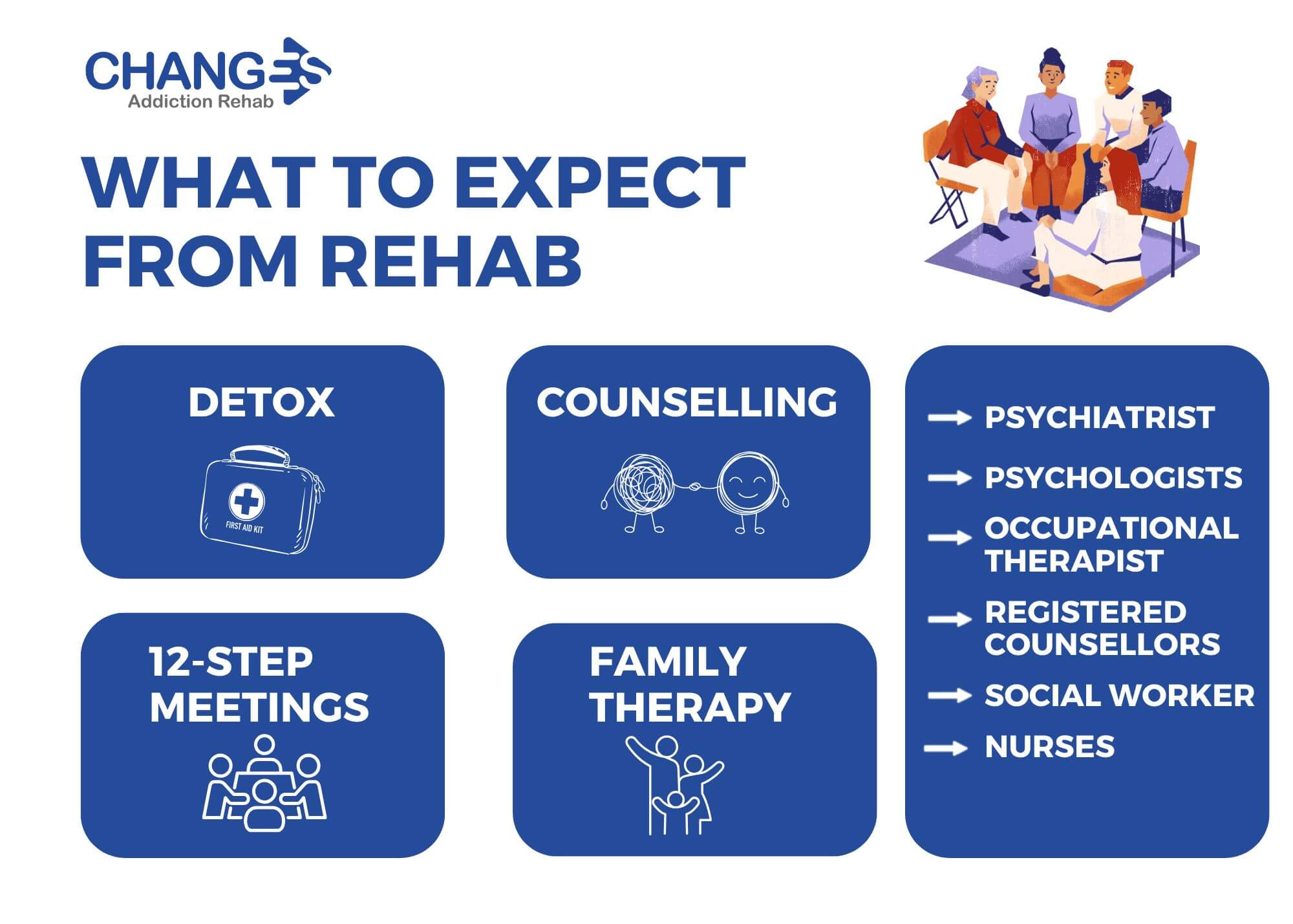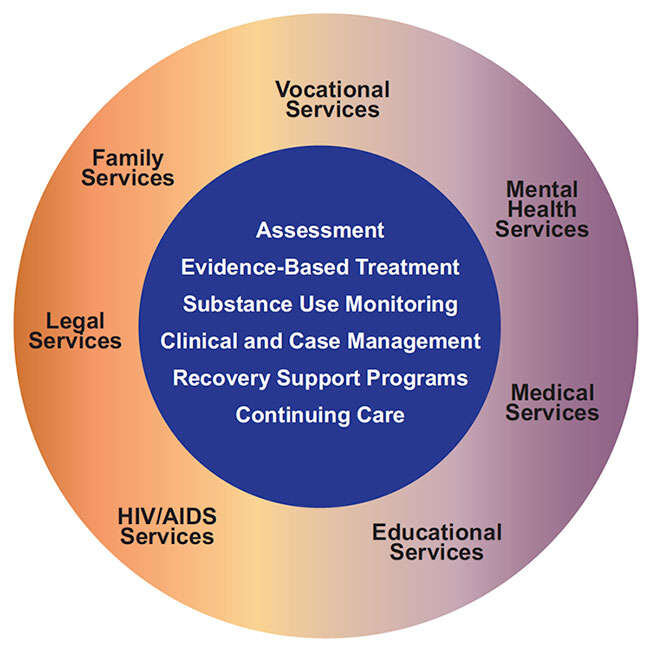How Inpatient rehab offers structure for lasting recovery
Wiki Article
A Comprehensive Guide to Substance Abuse Rehabilitation
Substance Abuse rehabilitation, commonly described as rehab, is a structured procedure created to help individuals get over reliance on medicines, alcohol, or various other addicting compounds. It is not just regarding cleansing-- it is a trip of mental, emotional, and physical makeover. Rehab centers provide risk-free environments where people can confront the source of their dependency, address mental triggers, and learn dealing devices to endure long-lasting soberness. This procedure is led by qualified professionals, including therapists, clinical physicians, and therapists that comprehend the intricate nature of dependency as both a behavior and physical problem.Comprehending the Core important Abuse Recovery
At its core, rehabilitation is about restoring an individual's life. Dependency commonly leaves deep marks-- strained connections, financial distress, health issue, and mental illness. Through detailed rehab programs, individuals are provided the devices to repair these elements progressively. Rehab isn't practically abstaining from compounds; it has to do with recovering control and uncovering one's sense of self-worth. The programs emphasize framework, uniformity, and individual responsibility, which are essential to long-lasting healing success. Every little landmark throughout rehab acts as a foundation for lasting sobriety.Substance Abuse Abuse rehabilitation is not a one-size-fits-all approach. It identifies that each individual's addiction tale is special-- what brought about Substance Abuse abuse, how it proceeded, and just how healing can be sustained vary widely. As a result, therapy facilities tailor treatment strategies based on individual evaluations, making certain that every client obtains support that aligns with their psychological state, dependency history, and life circumstances. This individualized approach substantially improves recovery end results and helps protect against regression as soon as people rehabilitate into day-to-day life.
The Benefits of Inpatient Rehabilitation Programs
Inpatient rehab, likewise referred to as residential therapy, supplies among the most effective approaches for those fighting serious Substance Abuse addiction. One of its key advantages is the distraction-free and structured atmosphere. When a person goes into an inpatient facility, they are temporarily removed from external triggers-- such as close friends that make use of compounds, stressful work environments, or household disputes-- that might hinder their recovery. This seclusion from adverse influences permits individuals to focus totally on healing. Living within a monitored and encouraging setting develops the stability required to break old practices and develop healthier patterns of actions.Another major advantage of inpatient rehab is the 24/7 professional guidance offered to every patient. Withdrawal signs and symptoms from medicines or alcohol can be uncertain and, in many cases, serious. Inpatient centers have medical teams that supply day-and-night care, guaranteeing patients are comfy and secure throughout cleansing. Beyond physical wellness, constant supervision additionally provides emotional reassurance-- patients know that aid is offered any time, which minimizes anxiety and constructs count on the recuperation process. This prompt accessibility to psychological and clinical assistance significantly enhances the success price compared to outpatient look after serious dependencies.
Inpatient rehab programs cultivate a strong feeling of community and accountability. People communicate with others that share comparable struggles, join team treatment, and participate in tasks that encourage synergy and empathy. This setting nurtures mutual understanding and lowers feelings of isolation commonly connected with dependency. By getting in touch with peers and picking up from their experiences, people develop social bonds that remain to sustain them even after leaving the center. This sense of belonging, combined with constant professional support, makes inpatient rehabilitation an extremely effective foundation for sustainable recovery.
Inpatient Rehab Solutions Offered
Inpatient rehab facilities offer a varied series of services designed to deal with the body, mind, and spirit simultaneously. The initial stage usually entails clinical detoxing, a process that safely eliminates substances from the body while managing withdrawal signs. Detoxification is overseen by doctor that may administer medication to alleviate pain and prevent issues. When detox is complete, individuals shift to organized day-to-day programs that include health, therapy, and counseling tasks. This integrated approach guarantees that patients not only get over physical dependence but likewise address emotional and emotional aspects of dependency.Restorative solutions are at the heart of inpatient rehabilitation. Facilities deal individual treatment sessions, where people function one-on-one with qualified specialists to reveal the underlying reasons for their addiction-- such as trauma, mental health and wellness conditions, or unsolved emotional discomfort. Cognitive-behavioral treatment (CBT), dialectical actions therapy (DBT), and motivational speaking with are among the most common evidence-based approaches utilized. On top of that, team treatment sessions offer a helpful area for clients to share experiences, gain perspective, and develop social skills. Family members therapy is also often included, helping to rebuild trust and boost communication in between patients and their enjoyed ones.
Past typical treatment, lots of inpatient programs include leisure and all natural solutions to advertise general wellness - substance abuse treatment Morris County. Yoga exercise, meditation, art therapy, and fitness programs aid lower stress and anxiety and instruct mindfulness. Nutritional therapy makes sure that clients restore physical wellness, as Substance Abuse usually diminishes the body's vital nutrients. Some rehabilitation centers even offer occupation training and academic workshops to assist individuals plan for reintegration right into society. These diverse solutions are developed to recover the entire person-- not just deal with addiction symptoms-- by promoting equilibrium, durability, and function
Why You Must Take Into Consideration Outpatient Programs
While inpatient rehab provides a extensive and immersive approach, outpatient programs give an alternative that allows adaptability for individuals who can not devote to permanent domestic treatment. Outpatient rehab enables clients to obtain organized therapy and medical assistance while preserving their everyday responsibilities-- such as household, work, or college care. For lots of individuals with light to modest dependency, outpatient treatment supplies the best balance between recovery and day-to-day life. It allows patients to practice the coping abilities they find out in real-world atmospheres, strengthening their resilience despite day-to-day obstacles.An additional factor to take into consideration outpatient programs is their cost-effectiveness. Inpatient treatment can be expensive due to lodging, meals, and 24-hour guidance, which may not be economically possible for everybody. Outpatient programs, nonetheless, normally set you back less because they do not call for property remains. Numerous centers use sliding-scale payment options or approve insurance coverage to make therapy accessible. For those that have actually currently completed inpatient rehabilitation, transitioning into an outpatient program acts as a valuable continuum of care, helping keep responsibility and stop regression through continuous support.
Furthermore, outpatient programs offer a high degree of customization. Individuals can select between partial a hospital stay programs (PHP), extensive outpatient programs (IOP), or basic outpatient treatment, depending on their level of need. Each choice supplies varying degrees of structure and time commitment. As an example, IOPs commonly involve a number of therapy sessions each week, while common outpatient treatment might consist of weekly counseling brows through. This flexibility makes sure that people can obtain expert aid tailored to their recuperation phase, making outpatient programs a practical and equipping option for long-lasting healing check out this site upkeep.

Checking Out Other Therapy Alternatives basically Abuse Healing
Past inpatient and outpatient rehabilitation, there are numerous other treatment options offered for people seeking recovery from Substance Abuse dependency (rehab near Chester NJ). Medication-assisted therapy (MAT) is one such technique, combining recommended medicines with behavioral therapy to manage withdrawal symptoms and minimize yearnings. Drugs like buprenorphine, naltrexone, or methadone are commonly used in opioid addiction treatment, while acamprosate or disulfiram may support alcohol recovery. Floor covering aids maintain mind chemistry, permitting people to focus on therapy and way of life modifications without the frustrating pain of withdrawal
Alternative treatments are additionally becoming significantly popular basically Abuse treatment. These may consist of alternative methods like acupuncture, equine therapy, adventure-based therapy, and spiritual healing programs. While these techniques might not change traditional therapy, they can enhance it by enhancing psychological law, self-awareness, and self-confidence. The goal of exploring different treatment options is to develop a healing plan that reverberates with each individual's values, ideas, and lifestyle. An individualized combination of treatments frequently yields one of the most lasting results, equipping individuals to live a meeting, substance-free life.
The Course to Long-Term Soberness and Healing
Finishing rehab-- whether inpatient look these up or outpatient-- is only the beginning of a long-lasting recovery trip. Aftercare programs play a critical duty in preserving soberness and preventing relapse. These programs may consist of ongoing therapy, support system like Narcotics Anonymous or Twelve Step Programs, and sober living arrangements that provide ongoing framework. Consistency and area are vital; individuals that remain connected to healing networks are much more likely to maintain lasting progression. Rehab educates the required coping abilities, however aftercare makes sure that those skills are used and strengthened in real-life situations.Long-lasting recuperation additionally depends on way of living changes that sustain physical and mental health. Establishing healthy habits-- such as normal workout, well balanced nutrition, and mindfulness techniques-- assists bring back balance to the mind and body. Taking part in purposeful activities like volunteering, pursuing hobbies, or reconnecting with loved ones can fill up the emotional void left by Substance Abuse usage. Establishing a positive state of mind and concentrating on future objectives offer recouping individuals a renewed feeling of identification and instructions. Soberness is not concerning deprival; it has to do with recovering life's richness and chances.

Via extensive rehabilitation programs, individuals are provided the tools to fix these elements gradually. Inpatient rehabilitation programs foster a strong sense of community and accountability. While inpatient rehabilitation supplies a intensive and immersive strategy, outpatient programs supply a choice that enables adaptability for people that can not devote to permanent property treatment. Outpatient rehabilitation enables individuals to get organized therapy and clinical support while maintaining their everyday duties-- such as household, school, or work care. Beyond outpatient and inpatient rehab, there are numerous various other therapy choices offered for people looking for visit homepage recuperation from Substance Abuse dependency.
Report this wiki page